v1.
Philosophy, the City, and the Belly Dancer
The
Dance of Life
The motto of Dubrovnik is
Libertas. That motto is lived each and every night at the Troubador
Hard Jazz Caffe, where, when I was there in July, 2002,
manager/bass player Marko Breskovic provided an
environment of free music and warm conviviality. With sons Toni on piano and
vocals (and sometimes trombone), Niki on drums, and Vlaho on congas, the music just poured out.
The first night
I found myself accompanying a belly dancer, Susan Frankovich,
on harmonica, as well as playing congas. Here's some live music I was able to
record with a little recorder in front of the band. First, a wild Gypsy Balkan
version of Summertime, accompanying and
improvising to Susan's dancing:
Gypsy
Summertime in the Balkans: Live at the Troubador Hard
Jazz Caffe
Marko Breskovic, bass; Toni Breskovic,
piano & vocals; Niki Breskovich, Drums; Gene
on harmonica; Susan Frankovich, Belly dance finger
bells
Dubrovnik,
Croatia, July 5, 2002
And a cut from Duke Ellington's C Jam Blues, Gene on harmonica: C Jam Blues Cut
A brief sample on a Spanish motif, Gene on congas: Spanish Sample
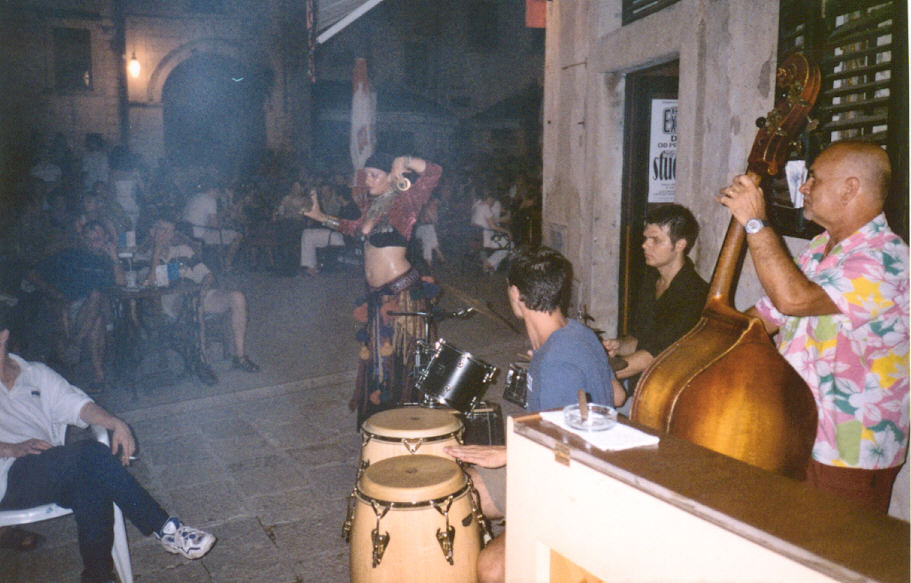
The Troubador is a place locals also
come to relax, talk, and listen in the outdoor summer warmth. During my stay
the first week of July I played music there every night, never knowing quite
what was coming up next nor caring, really. The carnival of life just poured
out.
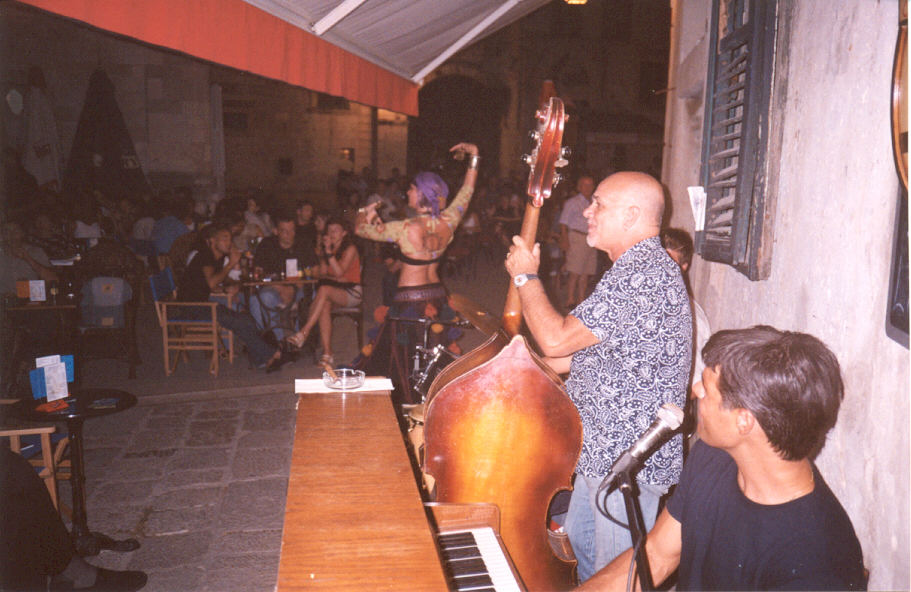
The second night Marko introduced me to a diva from South Africa
in the audience, who was on holiday with her husband and daughter, and we
talked of her transition between opera and broadway musicals, and of music more generally.
The third night Marko's 15 year-old niece belted out "I Will Survive" like a seasoned pro. Another night I sat at a table with a Croatian sailor, his wife, and Susan, talking about the sailor's life at sea around the world, of how his wife can now travel with him. Susan spoke of how she arrived in Dubrovnik from Arizona with ten dollars and the desire to go to Spain, to dance her way to Spain. She was dancing on the edge, free. Through the touch of her finger bells and entrancing gestures, her rhythm rhapsody called out our improvising.
Hypnotizing hips shake the gaze of entrancement onto themselves. Unwary tourists walking through end up entranced, like Odysseus lashed to the mainsail with his ears unblocked, end up turned into participants in the hypnotic dance of life underway, transfixed until the song is over.
No exit, only
entrance, entrancing entrance. We musicians, entrancers
entranced, pouring out the energy that the moment is pouring in, sacred vessels
of the music which pours through us.
This was heaven on earth, in the flesh, in the music, in the air,
in the dancing, in the stones, in the people in the city in the moment. Pouring
music out of the not-yet into the now, the ambrosia of life, pouring out
creation. Being the creation, fully immersed in it, in the dance of life.
Life flows as
heaven on earth at each and every moment if we open our hearts and our
awareness and our love and allow ourselves to feel it as it truly is:
infinite creation.
For as the medieval poet Rumi put it:
...We have fallen into the place
where
everything is music.
Stop the words now.
Open
the window in the center of your chest,
and
let the spirits fly in and out.
Jumpin'
Gene Halton
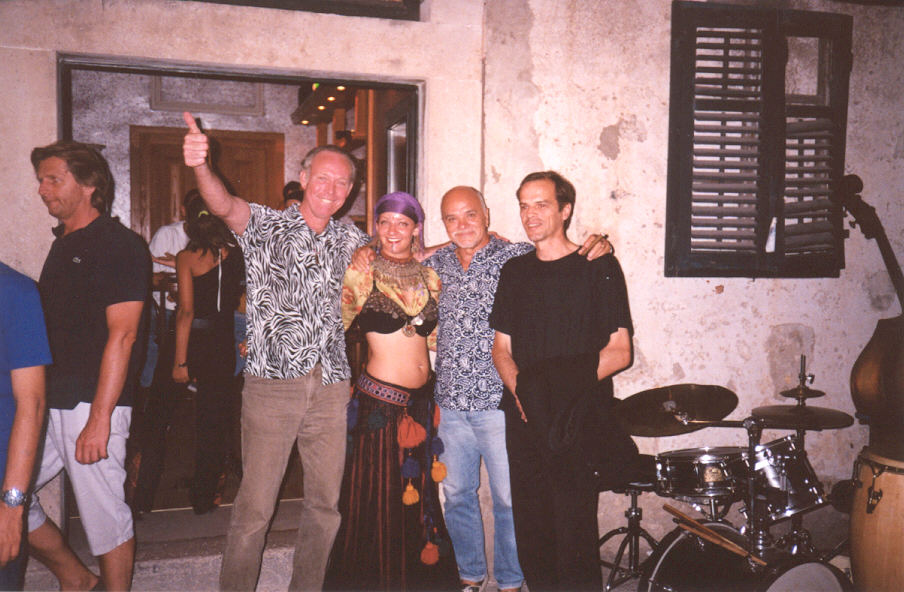
Left
to right: Jumpin' Gene Halton,
Susan Frankovich, Marko Breskovic, Frano Grce
2. Philosophy, the City, and
the Athenian
Philosopher
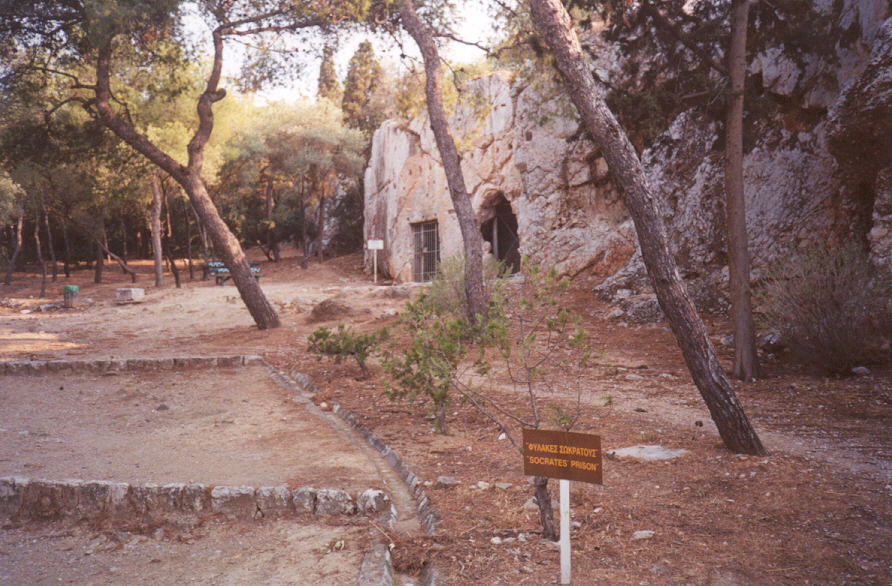
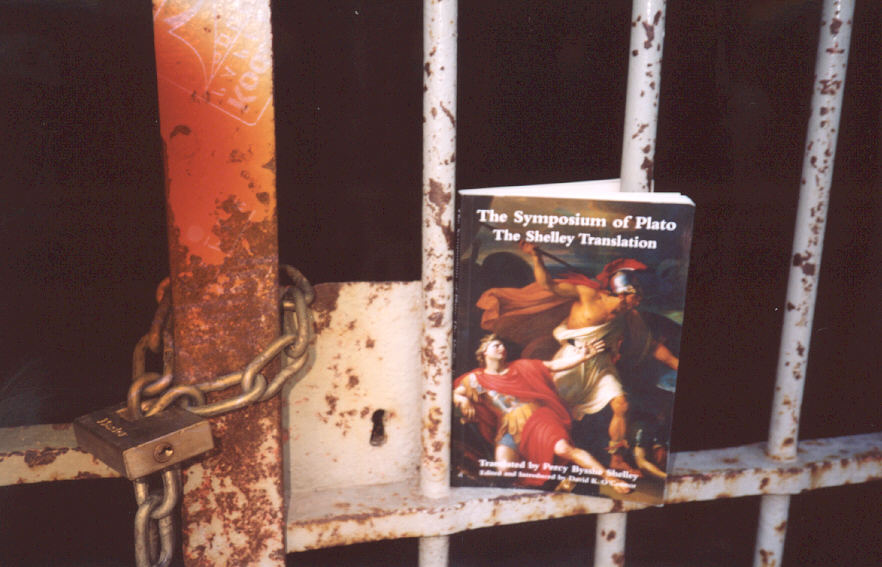
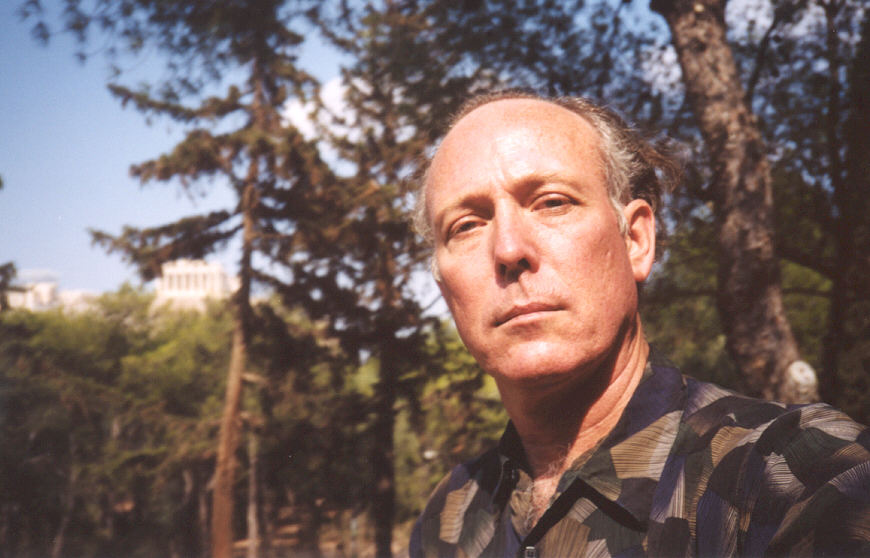
Wednesday July 10,
2002
Eugene Halton facing the gates of
Socrates' prison cell
which faces the Acropolis
Athens, Greece
Socrates the tekton, imprisoned finally in stone,
doomed to view the Acropolis while awaiting his end. There stood in his vision
and in ours today the Parthenon, temple of Athena, in all its glory, and the other
great works from Socrates' own lifetime and well before.
The sacred Acropolis, what went on in Socrates as he gazed upon it?
What did he think of the Parthenon, for which Pericles emptied the treasury to
build?
Did Socrates, himself a stonecutter, help build the Parthenon? Are his stones still
there, standing immortal? Or scattered amid the ruins?
The man who would not write inscribed by his wordless deeds in the enduring
stones?
And his prison. After a lifetime of working stones, only to be locked in a
living tomb carved from the rock.
Did Socrates, unknown to his devoted students, do stonework on his prison
itself, carving, say, the indentations in the floor of the left entry?
Eugene Halton
**************************************************************
from ending of Plato's Phaedrus, where Socrates and Phaedrus converse in the country outside the city walls, a prayer offered by Socrates:
Socrates: Beloved Pan, and all ye other gods who haunt this place, give me beauty
in the inward soul; and may the outward and inward man be at one. May I reckon
the wise to be the wealthy, and may I have such a quantity of gold as a
temperate man and he only can bear and carry.